Introduction
- The Constitution of India listed the rights to the citizens of India that would be specially protected and known as the ‘Fundamental Rights.’
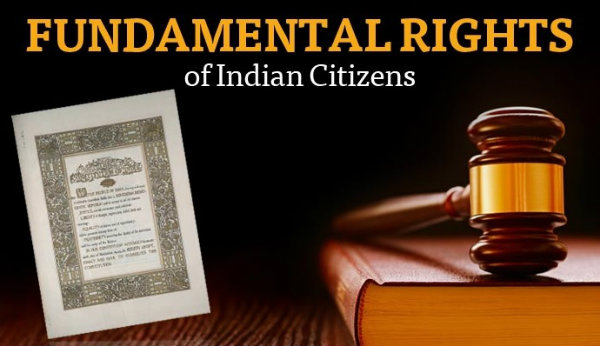
- ‘Fundamental’ means the Constitution has separately listed and made special provisions for the protection of ‘Fundamental Rights.’
- Fundamental Rights are different from other rights (i.e. ordinary legal rights) available to the citizens of India.
- Ordinary legal rights are protected and enforced by ordinary law; but Fundamental Rights are protected and guaranteed by the Constitution of India.
- Ordinary Rights may be changed or amended by the legislature by ordinary law making process, but a Fundamental Right may only be changed by amending the Constitution itself.
- Judiciary has the powers and responsibility (assigned by the Constitution) to protect the Fundamental Rights; in case any government’s action violates it.
- Judiciary, if found any act of the government (either by Executive or by Legislature) equivalent to violation of the Fundamental Rights, can be declared that act illegal or restrict them to do further so.
- However, Fundamental Rights have some reasonable restrictions and hence, they are not absolute in nature.
- Furthermore, the preamble to our Constitution speaks of ensuring all its citizens equality, liberty, and justice. Fundamental Rights put this promise into effect.
- Fundamental Rights are very essential to everyone’s life. They are the basic feature of the Constitution.
- The Constitution of India provides six Fundamental Rights, which are mentioned in Articles 12 to 35 in Part-III (of Constitution).

Right to Equality
- The Rule of law is the foundation of Indian democracy that states that the laws apply in the same manner to all, irrespective of a person’s status. It means that the Prime Minister of the country or a poor farmer in a remote village is subject to the same law and equal treatment.
- Article 14 states that the government shall not deny to any person, equality before the law or the equal protection of the laws, which means −
- Laws apply in the same manner to all;
- No person is above the law;
- Every citizen is subjected to the same laws and same treatment;
- No person can legally claim any special treatment or privilege on any of the ground; and
- Law makes no distinction between a political leader, a government official, and an ordinary citizen.
- Article 15 states that no citizen can be discriminated against on the basis of his/her religion, race, caste, sex, or place of birth.

- Article 15 further enhanced the Right to Equality by providing that every citizen shall have equal access to public places like shops, restaurants, hotels, and cinema halls. Similarly, there shall be no restriction with regard to the use of wells, tanks, bathing ghats, roads, playgrounds, and places of public resorts maintained by the government.
- Article 16 states that the State cannot discriminate against anyone in the matters of employment.
- Article 17 abolishes the practice of untouchability in any form, which states that every person has access to all public places including playgrounds, hotels, shops, etc.
Right to Freedom
- Freedom means non-interference and absence of restrictions in one’s affairs by others, whether it be the individuals or the Government.

- The Constitution of India provides all citizens ‘freedom’ under Article 19 to do any of these following acts −
- Right to Freedom of speech and expression;
- Right to form assembly in a peaceful manner;
- Right to form associations and unions;
- Right to move freely throughout the country;
- Right to reside in any part of the country; and
- Right to Practice any profession, or to carry on any occupation, trade, or business.
- However, there are certain reasonable restrictions that can be imposed upon the citizens by the Government in the larger interests of the society.
- Likewise, though every citizen has the right to all these freedoms, but it is subject to reasonable restrictions such as −
- The expression of freedoms should not cause public nuisance or disorder.
- This freedom of one should not violate others’ right to freedom.
- Freedom is not unlimited right to do what one wants.
- Accordingly, the government can impose certain reasonable restrictions (on freedoms of citizens) in the larger interests of the society.
- The Honorable Supreme Court of India has explained the ‘freedom’ under Article 21 as −
- No citizen can be killed unless the court has ordered a death sentence.
- No person can be arrested or detained by the police officer unless he has proper legal justification.
- As per the guidelines settled by the Hon’ble Supreme Court of India, a police officer while arresting a person has to follow some procedures −
- The police officer is duty bound to inform the person (in case of his arrest), the reason/s of his arrest and detention and the person so arrested has the right to know the reason for his arrest.
- It shall be the duty of the police officer to produce the arrested person before the nearest magistrate within a period of 24 hours of arrest.
- The arrested person has the right to consult a lawyer of his choice for his defense.
Right against Exploitation
- The Constitution of India provides distinct and clear provisions to prevent exploitation of the weaker sections of the society.
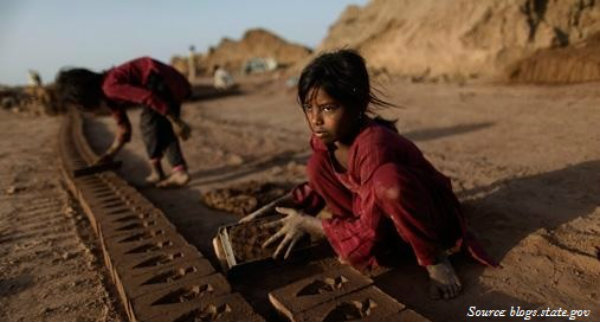
- The Constitution prohibits the following practices as evil and declares them illegal −
- Trafficking of human beings, i.e., the selling and buying of human beings, (generally, women and children are the victims of trafficking).
- Forced labor or beggar in any form is illegal and is prohibited (beggar is work or service without remuneration, which is called as bonded labor if this practice runs through life of the worker).
- Child labor is also prohibited. The children below 14 years of age, cannot be employed to work in any factory or mine or in any other hazardous work, such as railways and ports.
- The Parliament of India has enacted laws to implement constitutional right that prohibits children below 14 years of age from working in hazardous industries such as beedi making, firecrackers and matches, printing, and dyeing.
Right to Freedom of Religion
- India is a secular state, which means the State has no official religion and India does not promote/protect any one religion over the other religion.
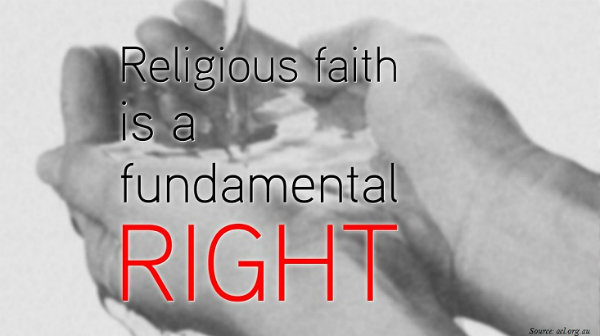
- The Fundamental Rights under Articles 25 to 28 facilitate individuals the freedom to live by their religious beliefs and practices as they interpret these beliefs.
- Every citizen in India has liberty to profess, practice, and propagate the religion that he or she believes in.
- Every sect or a religious group is free to manage its religious affairs, but it is subject to reasonable restrictions debarring, any person, or organization to compel another person to convert into his religion by means of force, fraud, inducement, or allurement.
- This right is in the form of restrictions upon the government not to compel any person to pay any taxes for the promotion or maintenance of any particular religion or religious institution.
- In the educational institutions run or added by the government, neither any religious instruction can be imparted nor can any person be compelled to take part in any religious instruction or to attend any religious worship.
Cultural and Educational Rights
- The democracy is based upon the wishes of the majority. In this system, the right and interest of the minorities need to be protected by developing a mechanism that cannot be changed prejudicially by the majority.
- Therefore in a democratic country, Special Protection is provided in the constitution to preserve and develop the language, culture, and religion of minorities.
- Any section of citizens with a distinct language or culture has the right to conserve its language, culture, and religious practices.
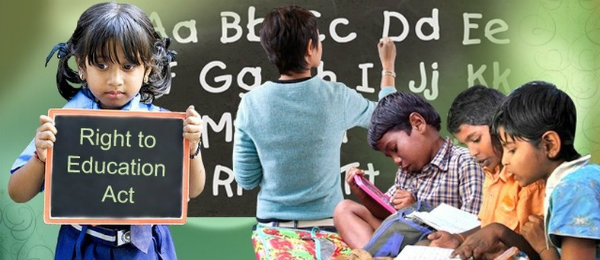
- Articles 29 and 30 provide Cultural and Educational Rights, which states that all minorities, religious or linguistic groups, having a distinct language, script or culture of its own can set up their own educational institutions in order to preserve and develop their language, script, or culture.
Right to Constitutional Remedies
- A person aggrieved by the violation of any of his/her fundamental right can approach either to the Supreme Court (under Article 32) or High Court (under Article 226) for the restoration of his/her fundamental right/s.
- The enforceability of rights is a very important aspect of all fundamental rights and hence, it is called as the “Right to Constitutional Remedies.”
- According to Dr. Ambedkar, the right to constitutional remedies is the ‘heart and soul of the Constitution.’
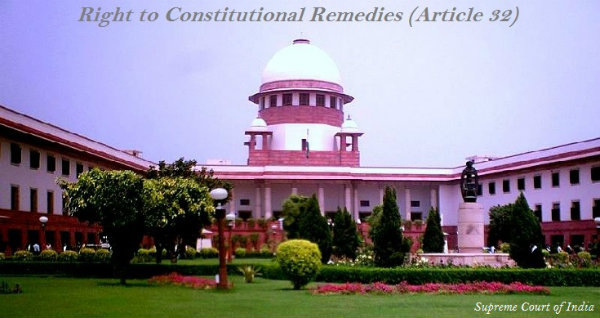
- If someone violates someone’s Fundamental Rights, then he/she can approach either a High Court or directly the Supreme Court to get proper remedy.
- The Supreme Court or the High Court (as the case may be) can issue orders (known as writs) and give directives to the Government for the enforcement of Fundamental Rights.
- Following are the five writs/orders issued by either the Supreme Court or High Courts −
- Habeas corpus − A writ of habeas corpus means that the court orders that the arrested person should be presented before the court. The court can also order to set free an arrested person if the manner and/or grounds of arrest are not lawful or satisfactory.
- Mandamus − This writ is issued when a court finds that a particular office holder is not doing legal duty and thereby is infringing on the right of an individual.
- Prohibition − This writ is issued by a higher court (High Court or Supreme Court); when a lower court has considered a case, which is going beyond its jurisdiction.
- Quo Warranto − If a court finds that a person is holding office but is not entitled to hold that office, it issues the writ of quo warranto and restricts that person from acting as an office holder.
- Certiorari − Under this writ, a higher court orders a lower court or another authority to transfer a matter pending before it to the higher authority or court.
- Apart from the judiciary, some other bodies and mechanisms that protect an individual’s right are −
- The National Commission on Minorities,
- The National Commission on Women,
- The National Commission on Scheduled Castes, etc.
- In 1993, the Government of India has established ‘National Human Rights Commission’ (NHRC), which consists of −
- A former chief justice of the Supreme Court of India;
- A former judge of the Supreme Court;
- A former chief justice of a High Court, and
- Two other members who have knowledge and practical experience in the matters relating to human rights.
- However, NHRC does not have the power of prosecution. It can merely make recommendations to the government or recommend to the courts to initiate proceedings based on the inquiry that it conducted.
Expansion and Scope of Fundamental Rights
- Since independence, the scope of Fundamental Rights have expanded greatly to include several other rights from time to time.
- The Fundamental Rights embedded in our constitution are the source of all rights, based on this, the Government of India enacted several laws e.g. −
- Right to information,
- Right to freedom of press, and
- Right to education.
- The Parliament of India has amended the Constitution to include ‘school education’ as a Fundamental Right for the Indian citizens. Resultantly, now it is the duty and responsibility of the governments to provide free and compulsory education to all children up to the age of 14 years.
- The Parliament has enacted a law ‘right to information act’ under the Fundamental Right to freedom of thought and expression, which provides a right to seek information from the government offices.
- The Supreme Court of India by explaining the Fundamental Rights has further expanded the scope and meaning of the Fundamental Rights, as it included ‘right to food’ in the ‘right to life’ section (i.e. Article 21).

No comments:
Post a Comment